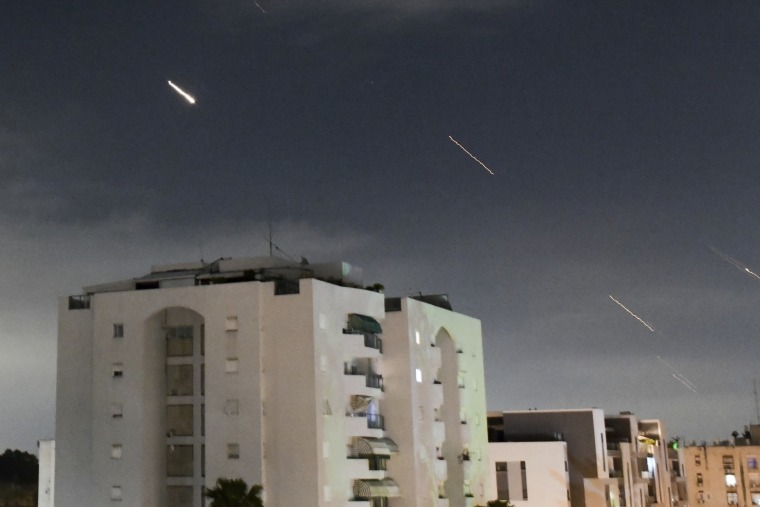Iran launched a retaliatory attack against Israel on Saturday that risks sparking a regional conflict involving U.S. military forces. The operation, which Israeli officials said included more than 200 missile and drones, marked the first time that Iran has launched a direct military attack on the Jewish state.
Several hours after the Iranian operation began, U.S. officials said that American forces in the region had shot down several Iranian drones and were attempting to shoot down Iranian missiles as well.
“U.S. forces in the region continue to shoot down Iranian-launched drones targeting Israel,” a U.S. official told NBC News. “Our forces remain postured to provide additional defensive support and to protect U.S. forces operating in the region.”
Follow live coverage of Iran’s attack on Israel
Israeli officials said that ballistic missiles, cruise missiles and drones were launched by Iran but the “vast majority” had been shot down. Rear Adm. Daniel Hagari, an Israel Defense Forces spokesperson, said a number of missiles landed in Israeli territory, causing damage to a military base and no casualties besides a young girl who was injured.
About 31 people were treated for anxiety or injuries they sustained while heading to a protected area when sirens sounded, Israel’s first responder service said.
Iran’s U.N. Mission issued a statement on X saying that Iran’s military action was in response to Israel’s attack on an Iranian diplomatic facility in Syria, an apparent reference to the April 1 bombing of an Iranian consular building in Damascus that killed two generals and five officers in the Iranian Revolutionary Guard Corps.
The statement said that Iran considered the matter “concluded” after the missile and drone strikes. But it warned that if Israel makes “another mistake,” Iran would deliver “a considerably more severe“ response.

A White House National Security Council spokesperson said that President Joe Biden was updated about the situation by his national security team. Biden also spoke with Israeli Prime Minister Benjamin Netanyahu by telephone, according to Israeli and U.S. officials.
U.S. forces in Iraq and Syria, as well as American warships in the region, were part of the effort to counter the Iranian attack, U.S. officials said. They include the USS Carney, a destroyer that has been involved in knocking out missiles and drones in the Red Sea fired by Iranian-backed Houthi forces from Yemen.
Through decades of tensions with Israel, Iran has previously avoided a direct conflict with the Jewish state, instead opting to damage its adversary through armed proxies in Lebanon, Syria, Gaza and elsewhere.
In back-channel communications with the U.S. over the past two weeks, Iran indicated it would retaliate against Israel but wanted to avoid an escalation that would lead to all-out war, U.S. officials said.
The question now is whether Iran’s attack will be interpreted in the way Tehran has planned, or trigger an unintended reaction from Israel that could escalate into an uncontrollable cycle of violence, analysts said.
Growing tensions
Tensions in the region have been at boiling point since Hamas’ deadly Oct. 7 terror attack and mass hostage taking and Israel’s subsequent full-scale assault on the Gaza Strip, which has resulted in the deaths of more than 33,000 and pushed the population to the brink of starvation.
The blast at the Iranian consular building in Damascus killed two of Iran’s top commanders, including Brig. Gen. Mohammad Reza Zahedi, a senior member of the Quds Force, the Islamic Revolutionary Guard Corps’ elite foreign espionage group.
His death marked the killing of the most senior Iranian official since Gen. Qassem Soleimani was targeted by an American airstrike in 2020.
Zahedi was a key figure in coordinating the so-called Axis of Resistance — the anti-Israel, anti-Western network of Iran-backed groups that operate with militants from across the Arab world. Tehran currently backs Hamas, Hezbollah and the Houthis — all of which in recent months have either attacked Israel directly or conducted attacks citing resistance to Israel.

How will Netanyahu respond?
There is concern among top U.S. officials that Israel could quickly respond to Iran’s attacks without thinking through the potential fallout, according to a senior administration official and a senior defense official.
Those concerns stem in part from the Biden administration’s views of the approach Netanyahu and other Israeli officials have taken to Israel’s war against Hamas, as well as the attack in Damascus.
U.S. officials have privately expressed frustration with Israel’s decision to strike the Iranian consulate in Syria, saying Israeli leaders did not think through the timing and implications of the attack, including how it might affect negotiations over the release of hostages held by Hamas.
“I don’t think they had a strategy,” the senior administration official said. “The Israelis don’t always make the best strategic decisions.”
Senior leaders at the Pentagon also have privately expressed frustration at the timing of the Damascus strike, according to the senior defense official, because it had the potential to be “catastrophically escalatory.”
In the days leading up to Iran’s retaliatory attack on Israel, U.S. intelligence showed that Iran’s leaders felt the need to respond to Israel’s strike in Damascus due to concern of domestic blowback if the strike went unanswered, according to the senior administration official.
Biden has privately expressed concern that Netanyahu is trying to drag the U.S. more deeply into a broader conflict, according to three people familiar with his comments.
While the White House believes the Israelis are not looking for a wider war or a direct war with Iran, particularly given the resources they have fighting the war in Gaza, U.S. officials can’t be certain, the senior administration official said.
The official described Israel’s approach to military operations as “frenetic.”
“There’s this urgency to act,” the official said, “and that’s what happened in Damascus.” The official said it’s the same frustration U.S. officials have with the way Israel is operating in Gaza.
The defense official echoed that sentiment, saying the Israelis have shown they are much better at operations than they are at planning. “They have surprised us with their really short-sided planning for the past few months so in that way Damascus isn’t as surprising,” the defense official said.
Now, the U.S. is contending with a potential war between rival nation states, the senior administration official said. That would be a dramatic and dangerous expansion of the long-simmering conflict between Iran and Israel that could further destabilize the Middle East.
